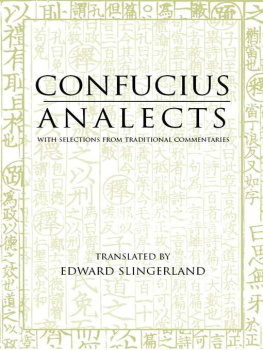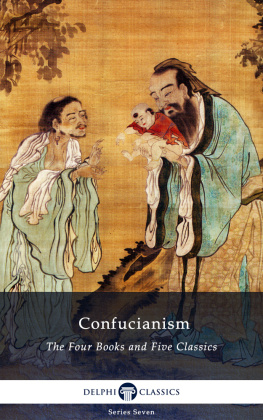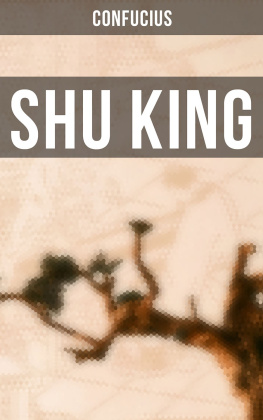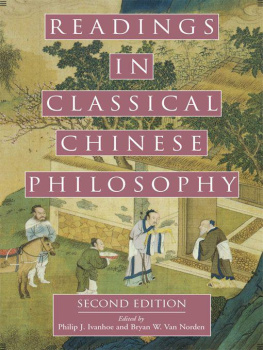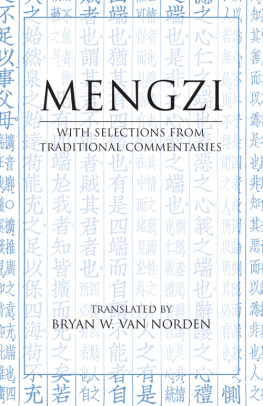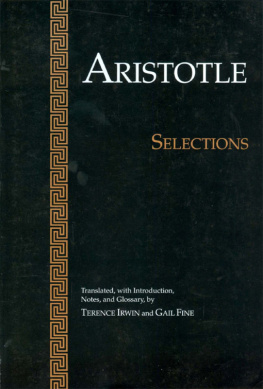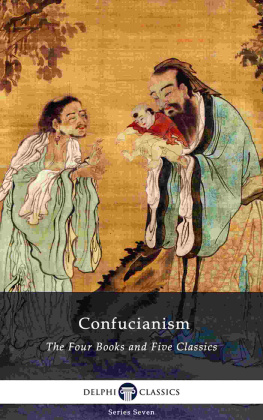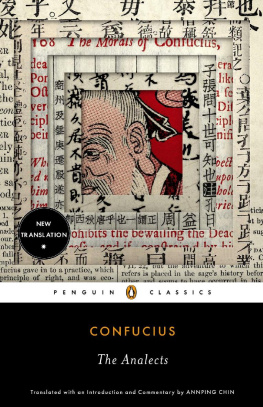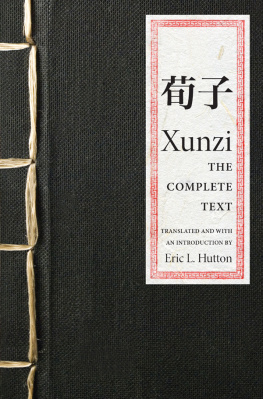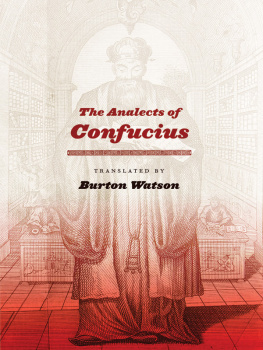

Copyright 2003 by Hackett Publishing Company, Inc.
All rights reserved
Printed in the United States of America
08 07 06 05 04 03 02 1 2 3 4 5 6 7
For further information, please address:
Hackett Publishing Company, Inc.
P.O. Box 44937
Indianapolis, IN 46244-0937
www.hackettpublishing.com
Cover design by Abigail Coyle
Text design by Jennifer Plumley
Composition by SNP Best-set Typesetter Ltd., Hong Kong
Printed at Sheridan Books, Inc.
Library of Congress Cataloging-in-Publication Data Confucius.
[Lun yu. English]
Confucius analects / translated by Edward Slingerland.
p. cm.
Includes bibliographical references.
ISBN 0-87220-636-XISBN 0-87220-635-1 (paper)
I. Slingerland, Edward G. (Edward Gilman) II. Title.
PL2478.L8 2003 |
181'.112dc21 | 2003047772 |
ISBN-13: 978-0-87220-636-6 (cloth)
ISBN-13: 978-087220-635-9 (pbk.)
PRC ISBN: 978-1-60384-095-8
TABLE OF CONTENTS
Analects
The Analects is not a book in the sense that most modern Westerners usually understand a bookthat is, a coherent argument or story presented by a single author, to be digested alone in the quiet of ones study. It is instead a recordsomewhat haphazardly collected and edited together at an unknown point in historyof a dynamic process of teaching, and most likely was only committed to writing many years after the primary touchstone of the process, the Master Confucius, had passed away. It probably represents an attempt by later students and followers to keep alive the memory of his teaching, which had been conveyed both verbally and by personal example. Many, if not most, of the passages are quite cryptic, and this may be at least partially intentional. In 7.16, the Master is reported as saying, I will not open the door for a mind that is not already striving to understand, nor will I provide words to a tongue that is not already struggling to speak. If I hold up one corner of a problem, and the student cannot come back to me with the other three, I will not attempt to instruct him again. As we see throughout the text, Confucius comments are often intended to elicit responses from his disciples, which are then corrected or commented upon by the Master. Therefore, these ordered sayings of Confucius were originally embedded in a conversational context within which their meaning could be gradually extracted.
By the late fourth century B.C.E., with the Master gone, direct conversation was no longer possible, but this merely forced the dialogue to take a different form. It is at this point that we get the beginning of what came to be an over two thousand year old tradition of commentary on the words of Confucius. The tradition begins with such Warring States texts as the Mencius , Xunzi , and the Record of Ritual , and continues up to the present-daycarried on for most of this time in classical Chinese, branching out into the various vernaculars of East Asian nations in the Chinese cultural sphere, and finally expanding in the 18th century into a wide variety of Indo-European languages. For the most part, this commentarial tradition represents an attempt by later followers or admirers of the Master to find the other three corners, no longer in dialogue with the Master himself, but rather by embracing extant clues about the Masters possible intention, the views of previous students of the text, and the opinions of contemporaries. For later students of the Analects , this written commentarial tradition serves as a proxy for the original conversational environment, providing context, making connections, and teasing out implications.
Since at least the Han Dynasty (202 B.C.E.220 C.E.), no Chinese student of the text has attempted to approach the Analects outside of the context of this written commentarial tradition. Most modern Chinese people, of course, read the textoriginally written in classical Chinese, a purely literary languagewith a translation into modern Chinese as well as extensive commentaries, but even traditionally educated Chinese conversant with the classical language find it necessary to base their understanding of the text upon the foundation of earlier commentaries. Indeed, the text of the Analects itself is arguably so concise as to be incomprehensible without some sort of interpretative apparatus imposed upon it. As John Makeham has noted, Unless a reader is provided with a commentarial context in which flesh is added to the very spare bones of the text, [the Analects ] frequently reads as a cryptic mixture of parochial injunctions and snatches of dry conversation. It is the commentaries which bring the text to life and lend it definition (1997: 261). I have therefore always found it astounding that Western readers of the Analects have, for the most part, been left to their own devices in understanding this exceedingly difficult text, being presented with simply the bare, original passages with usually no more than a translators introduction and occasional textual notes to rely on. Small wonder that so many have come away from the Analects with their impression of cryptic, mysterious Eastern fortune cookie wisdom reinforced. This, however, is not how the text is read in China, and is not at all how the text itself was originally meant. The passages that make up our received Analects were probably originally intended to be recited aloud, with teachers and students together discussing their meaning and subtleties. The commentarial tradition that has accreted around the text merely represents a written substitute for this original verbal interaction.
What this edition attempts to do is give the English-language reader a hint of the richness of this context, a glimpse of the living text in its natural habitat, by presenting it with extensive running commentary. Perhaps the best way to characterize the experience I am trying to create is to imagine reading the Analects with a friend by your side who knows classical Chinese, and already has some definite opinions about how to read the text, who then proceeds to skim through vast quantities of commentaries, sub-commentaries, textual notes, and other arcana surrounding the text and occasionally shout out things he or she thinks are helpful or illuminating, as well as providing recommendations for further exploration in the English-language scholarship. Not ideal, of course, but still a far sight better than being set adrift with only a translators introduction and the text itself, in all its cryptic glory. Of course, that actual situation is usually worse than that, for much of the cryptic quality of the original is already hidden in the translation by virtue of the choices the translator has to make in rendering the passages into intelligible English. As Alice Cheang has noted,
The first thing to disappear in a translation of the Analects its most distinctive formal characteristicis the opacity of the text. Much that in the original is dense and abstruse becomes clear, comprehensible, and pellucidly simple. The translator, constrained by the limits of the grammatically feasible, usually has to choose among several interpretations so that most of the latent ambiguity in the original is suppressed in the converted text What has been added is necessary in order to render the words of Confucius intelligible in another language, but the result is a text in which the balance of power is shifted towards the author (in this case the translator) and away from the reader. (Cheang 2000: 568569).
Another way to describe what I am trying to do, then, is that by providing alternative interpretations of individual passages and identifying where various understandings are coming from, as well as by pointing the reader in the direction of works that contain more detailed discussions of the issues at hand, I am trying to give back at least a measure of this power to the English-language reader. Not too much, of course, because a certain measure of control has to be exerted to avoid producing utter nonsense, but something approaching the maximum amount of power someone cut off from the text in its original language can reasonably hope. I myself have ceded a great deal of power to the editor of the fourvolume critical edition of the Analects which this translation is based, Cheng Shude 
Next page
